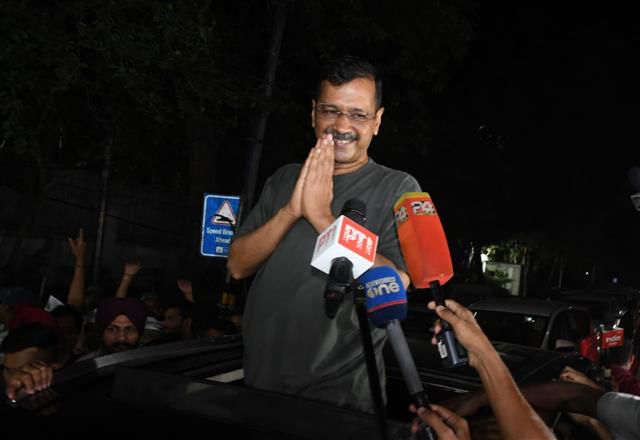Jahanvi Agarwal
The Supreme Court on 10th May 2024 granted interim bail to Delhi Chief Minister Arvind Kejriwal in the Delhi Excise Policy case until the conclusion of the ongoing Lok Sabha elections.
The decision was made by a division Bench of Justices Sanjiv Khanna and Dipankar Datta, who highlighted the need for a comprehensive and liberal perspective given the context of the 18th Lok Sabha General Elections.
In their ruling, the Bench acknowledged that Arvind Kejriwal faces serious accusations but has not been convicted yet. They highlighted that he has no criminal record and is not considered a threat to society.
The Conditions attached to Kejriwal’s bail include the following:
- He must furnish bail bonds amounting to Rs. 50,000/- along with one surety of the same amount to the satisfaction of the Jail Superintendent.
- He is prohibited from visiting the Office of the Chief Minister and the Delhi Secretariat.
- He is bound by the assurance that he will not sign any official files unless it is required and necessary for obtaining clearance/approval of the Lieutenant Governor of Delhi.
- He is refrained from making any comment regarding his role in the present case.
- He must not interact with witnesses or access official files related to the case.
The Court dismissed the argument raised by the prosecution that granting interim bail would unfairly benefit politicians over ordinary citizens. The judgment emphasized the necessity of considering the circumstances and individual peculiarities when deciding on interim relief.
In a prior hearing on May 7, the Supreme Court had hinted at granting interim bail to enable Kejriwal to campaign for the Lok Sabha elections, clarifying that he would be restricted from carrying out his official duties as Chief Minister during this period.
The Enforcement Directorate’s (ED) investigation into Kejriwal stems from a case filed by the Central Bureau of Investigation (CBI) in 2022 based on a complaint from Delhi Lieutenant Governor VK Saxena. The case alleges a criminal conspiracy involving AAP leaders, including Kejriwal and former Deputy Chief Minister Manish Sisodia, to manipulate the Delhi Excise Policy of 2021-22 to benefit certain liquor sellers.
Kejriwal’s arrest by the ED on March 21 led to his current detainment in Tihar Jail. The ED has argued that Kejriwal should not receive special treatment simply because he is a politician, while Kejriwal’s counsel contends that his rights are equal to those of any other individual, despite his position as Chief Minister.
Case Name: Arvind Kejriwal v. Director of Enforcement
Bench: Justices Sanjiv Khanna and Dipankar Datta

